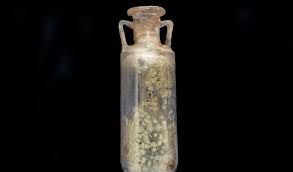 Spain Unguentarium (Cosano et al. 2023, Heritage)CÓRDOBA, SPAIN—According to a statement released by the University of Córdoba, a team of researchers led by chemist José Rafael Ruiz Arrebola has analyzed the contents of a 2,000-year-old vessel recovered from a mausoleum in southern Spain’s Roman city of Carmo. The mausoleum held the remains of six individuals in six urns, one of which was made of glass. The remains of a woman who died between 30 and 40 years of age were found in this glass urn, along with traces of a cloth bag that held a rock crystal flask sealed with a stone and bitumen and three amber beads. The well-preserved material inside the flask was examined with X-ray diffraction, gas chromatography, and mass spectrometry. The study determined that the ointment base had been made from a vegetable oil, perhaps olive oil, while the scent was derived from Pogostemon cablin, a plant from India used to produce the scent patchouli. The high quality of the flask holding the scent suggests that it was a valuable product. Read the original scholarly article about this research in Heritage. For more on Roman Spain, go to “Making an Entrance.”
Spain Unguentarium (Cosano et al. 2023, Heritage)CÓRDOBA, SPAIN—According to a statement released by the University of Córdoba, a team of researchers led by chemist José Rafael Ruiz Arrebola has analyzed the contents of a 2,000-year-old vessel recovered from a mausoleum in southern Spain’s Roman city of Carmo. The mausoleum held the remains of six individuals in six urns, one of which was made of glass. The remains of a woman who died between 30 and 40 years of age were found in this glass urn, along with traces of a cloth bag that held a rock crystal flask sealed with a stone and bitumen and three amber beads. The well-preserved material inside the flask was examined with X-ray diffraction, gas chromatography, and mass spectrometry. The study determined that the ointment base had been made from a vegetable oil, perhaps olive oil, while the scent was derived from Pogostemon cablin, a plant from India used to produce the scent patchouli. The high quality of the flask holding the scent suggests that it was a valuable product. Read the original scholarly article about this research in Heritage. For more on Roman Spain, go to “Making an Entrance.”















